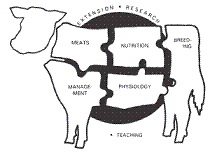Animal Science, Department of

Nebraska Beef Cattle Reports
Date of this Version
2025
Citation
2025 Nebraska Beef Cattle Report, pages 44-47
University of Nebraska Extension, 2025
Abstract
Summary with Implications
Increased demand for biofuel production has increased demand and price of commonly fed supplemental fat sources in beef operations. This finishing study evaluated the effect of feeding palm oil products on performance, carcass characteristics and methane production of feedlot finishing steers. Dietary treatments were feeding no supplemental fat or feeding one of the following fat sources at 4% of diet dry matter: whole palm oil, palm stearin, palm olein, or corn oil. Feeding supplemental fat, regardless of source, increased final body weight, average daily gain, and hot carcass weight. Feeding supplemental fat had no effect on dry matter intake, but an improvement in average daily gain led to improved feed conversion compared to cattle fed diets without supplemental fat. Marbling score was greater in carcasses of cattle consuming olein and stearin oil; however, no other differences in carcass characteristics were observed. A subset of pens sourced from the no oil or whole palm oil treatments were selected to rotate through chambers that measure enteric methane and carbon dioxide. Feeding whole palm oil reduced enteric methane yield (g/lb of DMI) by 14.8% compared to feeding no oil. These results suggest palm oil products can be used as a fat source for finishing cattle to improve feed efficiency and decrease methane production.
Included in
Large or Food Animal and Equine Medicine Commons, Meat Science Commons, Veterinary Preventive Medicine, Epidemiology, and Public Health Commons


Comments
Copyright 2025, Board of Regents, University of Nebraska. Used by permission